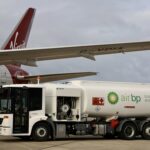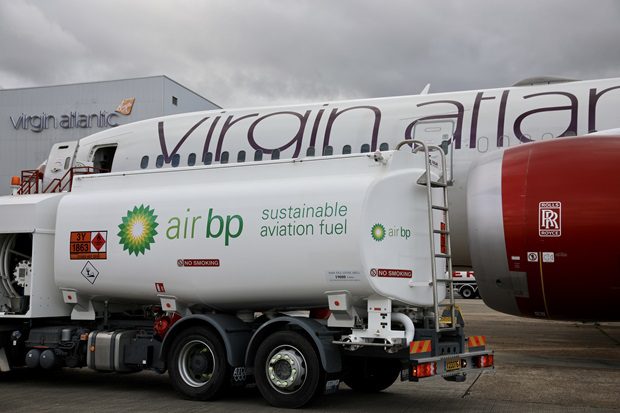 In an unprecedented move, Virgin Atlantic has successfully completed the world’s first transatlantic flight using 100% Sustainable Aviation Fuel (SAF), departing from London Heathrow and arriving at New York JFK. This historic journey marks a crucial step in the aviation industry’s pursuit of a greener future and the ambitious goal of achieving Net Zero emissions by 2050.
In an unprecedented move, Virgin Atlantic has successfully completed the world’s first transatlantic flight using 100% Sustainable Aviation Fuel (SAF), departing from London Heathrow and arriving at New York JFK. This historic journey marks a crucial step in the aviation industry’s pursuit of a greener future and the ambitious goal of achieving Net Zero emissions by 2050.
A Flight for the Future
Dubbed “Flight100,” this groundbreaking venture was more than a routine transatlantic journey. It signified a bold statement in the fight against climate change, showcasing SAF as a viable, safe alternative to traditional fossil-derived jet fuel. Virgin Atlantic collaborated extensively with a consortium of industry leaders, including Boeing, Rolls-Royce, Imperial College London, the University of Sheffield, ICF, and the Rocky Mountain Institute, under the auspices of the Department for Transport. This collaborative effort was crucial in realizing the vision of a sustainable aviation sector.
The Science Behind the Milestone
SAF is a revolutionary fuel derived from waste products that offers a reduction in CO2 lifecycle emissions of up to 70%. This is a significant leap in making long-haul flights more eco-friendly. The fuel for Flight100 was a unique blend of 88% Hydroprocessed Esters and Fatty Acids (HEFA) provided by AirBP and 12% Synthetic Aromatic Kerosene (SAK) supplied by Virent, a subsidiary of Marathon Petroleum Corporation. This blend is crucial for the fuel’s performance, ensuring compatibility with current engine designs and infrastructure.
Contrails and Climate Impact
A notable aspect of Flight100 was its focus on studying non-carbon emissions, such as contrails and particulates. These are byproducts of aviation fuel burning and significantly impact the environment. The research, backed by the expertise of Imperial College London and the University of Sheffield, aims to enhance scientific understanding of SAF’s environmental effects. Virgin Atlantic is committed to this research, actively participating in RMI’s Climate Impact Task Force.
The Path to Net Zero
The successful completion of Flight100 is a stark reminder of the urgent need for policy changes and investments to scale up SAF production. SAF accounts for less than 0.1% of global jet fuel volumes, with regulations permitting only a 50% SAF blend in commercial jet engines. This flight demonstrates that the challenge lies not in the feasibility of SAF but in the scalability, which is a matter of policy and investment.
The Role of Collaboration
The achievement of Flight100 is a testament to the power of collaboration. The partnership between Virgin Atlantic and its consortium is a model for how the aviation industry can unite to tackle environmental challenges. This collaboration extends beyond the skies, as data and research findings from the flight will be shared across the industry, fostering a spirit of openness and mutual progress.
Looking Ahead
The journey towards sustainable aviation is far from over. To reach the ambitious goal of Net Zero by 2050, the industry must continue to innovate and invest across all available feedstocks and technologies. The role of SAF is pivotal in this journey, but it is just one piece of a giant puzzle that includes ongoing research and development for new zero-emission aircraft.
In Conclusion
Virgin Atlantic’s Flight100 is more than a milestone; it’s a beacon of hope and a call to action for the aviation industry. It proves that sustainable long-haul flight is a possibility and a reality. As the world watches, Virgin Atlantic has set a new standard for eco-friendly aviation and charted a course for the industry’s sustainable future.
Written by: Matthew Thomas – From New York.















